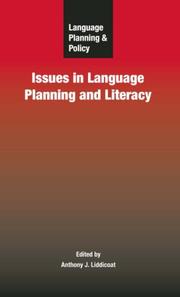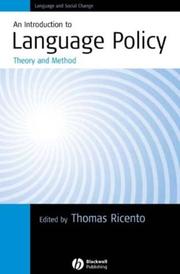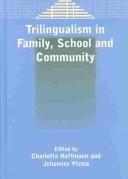| Listing 1 - 10 of 162 | << page >> |
Sort by
|


ISBN: 9781853599774 1853599778 9781853599781 1853599786 1280935049 9786610935048 9781280935046 6610935041 Year: 2007 Publisher: Bristol Blue Ridge Summit
Abstract | Keywords | Export | Availability | Bookmark
 Loading...
Loading...Choose an application
- Reference Manager
- EndNote
- RefWorks (Direct export to RefWorks)
While literacy has always been central to language planning work, there are fewer studies which focus primarily on literacy as a language planning activity. Often planning for literacy is treated as an aspect of status, corpus or language-in-education planning, rather than addressing literate practice itself as a planning objective. This volume investigates the complex issues and social and political pressures relating to literacy in a variety of language planning contexts around the world. The studies presented in this book examine language planning for literacy in official and vernacular languages and address issues relating to literacy in first and additional languages in North America, Asia, Africa, Europe and the Pacific. As a collection, these studies show that language planning for literacy is not simply a matter of planning a written version of a language, but involves more complex questions relating to the nature and practice of literacy and the power relations which exist within societies.
Language planning --- Language policy --- Literacy --- Language planning. --- Language policy. --- Literacy. --- Languages & Literatures --- Philology & Linguistics --- Illiteracy --- Glottopolitics --- Institutional linguistics --- Language and languages --- Language and state --- Languages, National --- Languages, Official --- National languages --- Official languages --- State and language --- Planned language change --- Government policy --- Planning --- Education --- General education --- Communication policy --- Sociolinguistics --- language and society. --- language policy. --- literacy in language planning. --- literacy. --- literate practice. --- official languages. --- power.

ISBN: 9781405114981 9781405114974 1405114975 1405114983 9786611214593 1281214590 1405144629 Year: 2006 Volume: 1 Publisher: Malden, Mass. Blackwell
Abstract | Keywords | Export | Availability | Bookmark
 Loading...
Loading...Choose an application
- Reference Manager
- EndNote
- RefWorks (Direct export to RefWorks)
An Introduction to Language Policy: Theories and Method is a collection of newly-written chapters that cover the major theories and methods currently employed by scholars active in the field. provides an accessible introduction to the study of language policy research and language's role in social life consists of newly commissioned essays written by internationally recognized scholars helps define and describe a growing field of inquiry and is an authoritative source for students, scholars and researchers in linguistics, applied linguistics, education, policy studies and related areas includes section overviews, annotated chapter bibliographies, and discussion questions
Language policy. --- Sociolinguistics --- Language policy --- Glottopolitics --- Institutional linguistics --- Language and languages --- Language and state --- Languages, National --- Languages, Official --- National languages --- Official languages --- State and language --- Government policy --- Communication policy --- Language planning
Book
ISBN: 0191745480 1283949482 0191639710 0191639729 9780191639715 9780191745485 9781283949484 9780199646616 0199646619 Year: 2012 Publisher: Oxford Oxford University Press
Abstract | Keywords | Export | Availability | Bookmark
 Loading...
Loading...Choose an application
- Reference Manager
- EndNote
- RefWorks (Direct export to RefWorks)
Globalisation and migration are producing societies of increasing linguistic diversity. At the same time, English is achieving unprecedented global dominance, smaller languages are becoming 'extinct' at an alarming rate, and ethnic tensions in countries from Belgium to Tibet continue to centre on questions of language. Against this background, the issue of how to ensure justice between speakers of different languages becomes a pressing social concern. Matters of 'linguistic justice'are therefore drawing increasing scholarly attention across a range of disciplines.How does international law con
Language and languages --- Language policy. --- Law and legislation. --- Glottopolitics --- Institutional linguistics --- Language and state --- Languages, National --- Languages, Official --- National languages --- Official languages --- State and language --- Communication policy --- Language planning --- Government policy


ISBN: 1853596922 1853596930 9786610828289 1853596949 1280828285 9781853596940 9781853596926 9781853596933 9781280828287 6610828288 Year: 2003 Publisher: Bristol Blue Ridge Summit
Abstract | Keywords | Export | Availability | Bookmark
 Loading...
Loading...Choose an application
- Reference Manager
- EndNote
- RefWorks (Direct export to RefWorks)
Countries in Africa, America, Asia and Europe provide the sociolinguistic contexts described in this volume. They involve settings where three or more languages are spoken and where speakers are trilingual. With the focus on family, school and the wider community, the book illustrates personal, social, cultural and political factors contributing to the acquisition and maintenance of trilingualism and highlights a rich pattern of trilingual language use.
Multilingualism. --- Language policy. --- Glottopolitics --- Institutional linguistics --- Language and languages --- Language and state --- Languages, National --- Languages, Official --- National languages --- Official languages --- State and language --- Communication policy --- Language planning --- Plurilingualism --- Polyglottism --- Government policy
Book
ISBN: 9027220824 1556191189 9786613121806 9027284768 1283121808 9789027284761 9781283121804 6613121800 9789027220820 9781556191183 Year: 1991 Publisher: Amsterdam ; Philadelphia : J. Benjamins Pub. Co.,
Abstract | Keywords | Export | Availability | Bookmark
 Loading...
Loading...Choose an application
- Reference Manager
- EndNote
- RefWorks (Direct export to RefWorks)
This volume begins with an overview of Joshua A. Fishman's extensive work and influence in the field of language planning. The other papers link language planning with weighty issues such as politics, ecology, and national development. More specific papers deal with the problems of political and social intricacies of language planning in the European Community, in India, on the African continent, in Israel, Cuba and Quebec. Two papers deal with corpus planning from a lexicological (Yiddish) and terminological point of view.
Language planning --- Language policy --- Language planning. --- Language policy. --- Glottopolitics --- Institutional linguistics --- Language and languages --- Language and state --- Languages, National --- Languages, Official --- National languages --- Official languages --- State and language --- Communication policy --- Planned language change --- Sociolinguistics --- Government policy --- Planning
Book
ISBN: 1282103547 9786612103544 0253002893 9780253002891 0253353017 9780253353016 0253220696 9780253220691 9781282103542 661210354X 9780253353016 9780253220691 Year: 2009 Publisher: Bloomington Indiana University Press
Abstract | Keywords | Export | Availability | Bookmark
 Loading...
Loading...Choose an application
- Reference Manager
- EndNote
- RefWorks (Direct export to RefWorks)
What makes someone willing to die, not for a nation, but for a language? In the mid-20th century, southern India saw a wave of dramatic suicides in the name of language. Lisa Mitchell traces the colonial-era changes in knowledge and practice linked to the Telugu language that lay behind some of these events. As identities based on language came to appear natural, the road was paved for the political reorganization of the Indian state along linguistic lines after independence.
Language policy --- Glottopolitics --- Institutional linguistics --- Language and languages --- Language and state --- Languages, National --- Languages, Official --- National languages --- Official languages --- State and language --- Communication policy --- Language planning --- Government policy --- India, South --- India, Southern --- South India --- Southern India --- Languages --- Political aspects.
Book
ISBN: 0773590803 9780773590809 9780773537057 0773537058 9780773537064 0773537066 Year: 2010 Publisher: Montreal
Abstract | Keywords | Export | Availability | Bookmark
 Loading...
Loading...Choose an application
- Reference Manager
- EndNote
- RefWorks (Direct export to RefWorks)
"Language issues have been and promise to continue to be at the heart of national political life in Canada. The results of governmental language policy play a crucial role in determining the unity of the country. However, despite its importance, language policy is often difficult to understand because it is part of a complicated political terrain where numerous policies intersect. Canadian Language Polices in Comparative Perspective presents a long-required assessment of the field and utilises a widely recognized comparative method that makes this volume the most systematic study of language issues available." "Capturing the dynamism of Canadian language policies, The essays in this volume analyse and compare the effects, histories, and features of language policies as they have been enacted and implemented by Canadian provincial and federal governments. The contributors' comparisons reveal significant domestic and international implications for language policy. An important study of a social and political issue that has immediate local, national, and international consequences, Canadian Language Policies in Comparative Perspective assembles knowledgeable authorities on language policy to provide a comprehensive synthesis of its consequences."--pub. desc.
Language policy --- Language policy. --- Glottopolitics --- Institutional linguistics --- Language and languages --- Language and state --- Languages, National --- Languages, Official --- National languages --- Official languages --- State and language --- Communication policy --- Language planning --- Government policy
Book
ISBN: 0801470560 132252260X 0801470579 9780801470578 9780801452628 0801452627 9780801479267 0801479266 9780801470561 Year: 2014 Publisher: Ithaca, NY
Abstract | Keywords | Export | Availability | Bookmark
 Loading...
Loading...Choose an application
- Reference Manager
- EndNote
- RefWorks (Direct export to RefWorks)
In After Newspeak, Michael S. Gorham presents a cultural history of the politics of Russian language from Gorbachev and glasnost to Putin and the emergence of new generations of Web technologies. Gorham begins from the premise that periods of rapid and radical change both shape and are shaped by language. He documents the role and fate of the Russian language in the collapse of the USSR and the decades of reform and national reconstruction that have followed. Gorham demonstrates the inextricable linkage of language and politics in everything from dictionaries of profanity to the flood of publications on linguistic self-help, the speech patterns of the country's leaders, the blogs of its bureaucrats, and the official programs promoting the use of Russian in the so-called "near abroad." Gorham explains why glasnost figured as such a critical rhetorical battleground in the political strife that led to the Soviet Union's collapse and shows why Russians came to deride the newfound freedom of speech of the 1990's as little more than the right to swear in public. He assesses the impact of Medvedev's role as Blogger-in-Chief and the role Putin's vulgar speech practices played in the restoration of national pride. And he investigates whether Internet communication and new media technologies have helped to consolidate a more vibrant democracy and civil society or if they serve as an additional resource for the political technologies manipulated by the Kremlin.
Language policy --- Glottopolitics --- Institutional linguistics --- Language and languages --- Language and state --- Languages, National --- Languages, Official --- National languages --- Official languages --- State and language --- Communication policy --- Language planning --- Government policy --- #KVHA:Cultuurgeschiedenis; Rusland --- #KVHA:Politiek; Rusland --- #KVHA:Taalkunde; Russisch
Book
ISBN: 1283424916 9786613424914 9027281831 9789027281838 9027249024 9789027249029 9781283424912 9789027249029 6613424919 Year: 2012 Publisher: Amsterdam Philadelphia John Benjamins Pub. Co.
Abstract | Keywords | Export | Availability | Bookmark
 Loading...
Loading...Choose an application
- Reference Manager
- EndNote
- RefWorks (Direct export to RefWorks)
This volume provides a first systematic, comprehensive account of English in Southeast Asia (SEA) based on current research by leading scholars in the field. The volume first provides a systematic account of the linguistic features across all sub-varieties found within each country. It also has a section dedicated to the historical context and language planning policies to provide a background to understanding the development of the linguistic features covered in Part I and, finally, the vibrancy of the sociolinguistic and pragmatic realities that govern actual language in use in a wide variet
English language --- Language policy --- Language planning --- Language and languages --- Planned language change --- Sociolinguistics --- Glottopolitics --- Institutional linguistics --- Language and state --- Languages, National --- Languages, Official --- National languages --- Official languages --- State and language --- Communication policy --- Germanic languages --- Variation --- Planning --- Government policy --- E-books
Book
ISBN: 9982240927 9789982240925 9781322502267 1322502269 9789982240888 9982240889 Year: 2014 Publisher: Lusaka, Zambia
Abstract | Keywords | Export | Availability | Bookmark
 Loading...
Loading...Choose an application
- Reference Manager
- EndNote
- RefWorks (Direct export to RefWorks)
"The primary objective of What on Earth is a Ruling Party in a Multiparty Democracy? is to provoke thought and thereby stimulate debate. To this end, provocatively, this collection of topical issues ranges from 'The place of the miniskirt in sociocultural development' to 'Which citizen in Zambia should not take part in (partisan) politics?' The Author, Mubanga E Kashoki, is a Professor of African Languages at the institute of Economic and Social Research in the University of Zambia"--Provided by publisher.
Language policy --- Glottopolitics --- Institutional linguistics --- Language and languages --- Language and state --- Languages, National --- Languages, Official --- National languages --- Official languages --- State and language --- Communication policy --- Language planning --- Government policy --- Zambia --- Politics and government. --- Social conditions.
| Listing 1 - 10 of 162 | << page >> |
Sort by
|

 Search
Search Feedback
Feedback About UniCat
About UniCat  Help
Help News
News